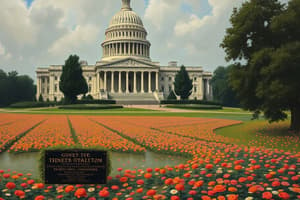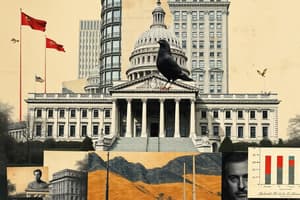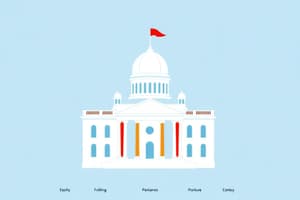Podcast
Questions and Answers
In what way did the Belgian Constitution change in 1993?
In what way did the Belgian Constitution change in 1993?
- It granted constitutional power to regional governments, independent of central government. (correct)
- It eliminated regional governments.
- It increased the powers of the central government.
- It merged the central and regional governments.
Which of the following governments maintains all the power in Sri Lanka, according to the text?
Which of the following governments maintains all the power in Sri Lanka, according to the text?
- The federal government.
- The national government. (correct)
- There is a balance of power between all government branches.
- The regional governments.
What is the defining characteristic of a federal system of government, according to the text?
What is the defining characteristic of a federal system of government, according to the text?
- All power is held by a single central authority.
- Regional entities have no power.
- Power is divided between a central authority and regional jurisdictions. (correct)
- Power is shared equally across all levels of society.
What is the typical structure of government under a federal system, as described in the text?
What is the typical structure of government under a federal system, as described in the text?
What is the primary goal of Tamil leaders in Sri Lanka with regards to the government system?
What is the primary goal of Tamil leaders in Sri Lanka with regards to the government system?
Flashcards
Federalism
Federalism
A system where power is divided between a central authority and regional governments, each with independent powers.
Unitary System
Unitary System
A system where the central government holds most power, with limited autonomy for regional governments.
Transition from Unitary to Federal
Transition from Unitary to Federal
A change in government structure where power shifts from the central government to regional governments.
Constitutionally Granted Powers
Constitutionally Granted Powers
Signup and view all the flashcards
Regional Autonomy
Regional Autonomy
Signup and view all the flashcards
Study Notes
Federalism
- Federalism is a government system where power is divided between a central authority and smaller constituent units.
- Usually, a federation has two levels of government: one for the entire country and others for provinces or states.
- The central government handles national interests, while state governments handle local matters.
- Both levels of government are independent of each other.
- Belgium shifted from a unitary to a federal form of government in 1993.
- Sri Lanka is currently a unitary system, but some Tamil leaders want it to become federal.
- Only about 25 of the world's 193 countries are federations, but their citizens represent 40% of the global population.
Studying That Suits You
Use AI to generate personalized quizzes and flashcards to suit your learning preferences.




